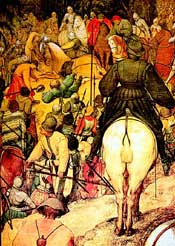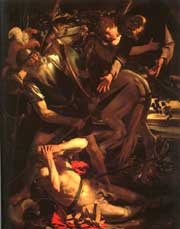Readings:
Daily Office:
AM Psalm 19;
Isaiah 45:18-25;
Philppians 3:4b-11
PM Psalm 119:89-112;
Ecclesiasticus 39:1-10;
Acts 9:1-22Eucharistic:
Acts 26:9-21;
Psalm 67;
Galatians 1:11-24;
Matthew 10:16-22Preface of Apostles and Ordinations
PRAYER (traditional language)
O God, who by the preaching of thine apostle Paul hast caused the
light of the Gospel to shine throughout the world: Grant, we beseech thee,
that we, having his wonderful conversion in remembrance, may show forth
our thankfulness unto thee for the same by following the holy doctrine
which he taught; through Jesus Christ our Lord, who liveth and reigneth
with thee, in the unity of the Holy Spirit, one God, now and for ever. Amen.
PRAYER (contemporary language)
O God, who by the preaching of your apostle Paul has caused the
light of the Gospel to shine throughout the world: Grant, we pray, that
we, having his wonderful conversion in remembrance, may show ourselves
thankful to you by following his holy teaching; through Jesus Christ our
Lord, who lives and reigns with you, in the unity of the Holy Spirit,
one God, now and for ever. Amen.
Return to Lectionary Home Page
Webmaster: Charles Wohlers
Last updated: 28 Nov. 2020
THE CONVERSION OF THE APOSTLE PAUL
(JANUARY 25)
On January 25 we remember how Saul (or Paul) of Tarsus, formerly an enemy
and persecutor of the early Christian Church, was led by God's grace to
become one of its chief spokesmen.
 Our
chief sources of information about the Apostle Paul are (1) several of
his own letters, preserved for us in the New Testament, and (2) the account
of him given by Luke in the book of Acts.
Our
chief sources of information about the Apostle Paul are (1) several of
his own letters, preserved for us in the New Testament, and (2) the account
of him given by Luke in the book of Acts.
One naturally asks whether we can be sure that the letters
attributed to Paul are in fact his. A partial answer is that a forger
would run into difficulty. If he wrote a letter, say, to the church at
Corinth during Paul's lifetime, and signed Paul's name, the Corinthians
would naturally mention it the next time they sent a message to Paul,
and Paul would naturally reply: "What are you talking about? I never
wrote anything like that!" If a letter supposedly to Corinth were
circulated after Paul's death, sooner or later a copy would reach Corinth,
and the members of the church there would ask, "If Paul wrote this
letter and sent it to us while he lived, how does it happen that no one
here has ever heard of it?" Thus, it would be difficult to obtain
credence for a forged letter to a congregation. This argument does not
apply to a letter to an individual (such as Timothy or Titus). Moreover,
it arguably does not apply to the Letter to the Ephesians. Although some
ancient copies of this letter begin:
Paul, an apostle of Christ Jesus by the will of God, to the saints who are [at Ephesus and] faithful in Christ Jesus:
other ancient copies read simply "also" instead of the bracketed
words. Thus, it is widely supposed that the letter was written as a general
form letter to many churches, with the name of the church to be filled
in in each particular copy. This view is supported by the fact that the
letter contains no personal greetings and makes no references to the past
history of the congregation addressed. Now, a forger might write such
a form letter, circulate it after Paul's death, and escape detection,
since no particular congregation could say, "Since we did not hear
of this letter before, Paul could not have written it." And accordingly,
we find that it is precisely Ephesians and the Pastorals (the letters
to Timothy and Titus) that are questioned by some scholars who acknowledge
Paul's authorship of all the other letters claiming to be by him. (I am
not counting the letter to the Hebrews, which is not signed.)
 Our other source of information is the book of Acts, where Paul (at first
called Saul) appears in 7:58-8:1; 9:1-30; 11:25-30; 12:25--28:31. Here
we read how Paul at first opposed and persecuted the Church, how he had
a vision of Christ and was converted, and devoted the rest of his life
to spreading the Gospel of Christ.
Our other source of information is the book of Acts, where Paul (at first
called Saul) appears in 7:58-8:1; 9:1-30; 11:25-30; 12:25--28:31. Here
we read how Paul at first opposed and persecuted the Church, how he had
a vision of Christ and was converted, and devoted the rest of his life
to spreading the Gospel of Christ.
Portions of this account include statements like "we
then crossed over to Troas," which are taken to mean that Luke was
a companion of Paul for part of Paul's journeys. Since these accounts,
particularly those of the shipwreck on Paul's last voyage, show every
sign of being accurate eyewitness accounts (see the book The Voyage
and Shipwreck of Saint Paul, by James Smith of Jordan Hill, FRS) and
since a comparison of the style of various portions of the book of Acts
makes it highly improbable that it is a scissors-and-paste job, with portions
of one man's work inserted into a story by someone else, many scholars
consider the claim that Acts was written by a companion of Paul to be
well established.
On the other hand, it is not always clear how the chronology
of Luke's account of the life of Paul is to be fitted with the autobiographical
snippets we find in Paul's own writings, and for this reason some scholars
dispute the genuineness of the book of Acts.
For an old but still worth-while introduction to the subject,
and a defense of the conservative position, I refer the reader to A
Historical Introduction to the New Testament (the title varies a bit
from one edition to another) by George Salmon, FRS. A portion of this
book (dealing with the authorship of the Fourth Gospel) can be obtained
at http://elvis.rowan.edu/~kilroy/CHRISTIA/library/john-part2.html
READING Acts 26:9-21
(Paul, on trial before Agrippa, recounts the story of his
conversion at Damascus)
PSALM 67
(God has blest us, and all the ends of the earth shall revere Him)
EPISTLE Galatians 1:11-24
(Paul writes of his conversion, and its implications)
THE HOLY GOSPEL Matthew 10:16-22
(Christ warns His disciples of persecutions to come, and encourages
them to stand firm and trust God)
by James Kiefer